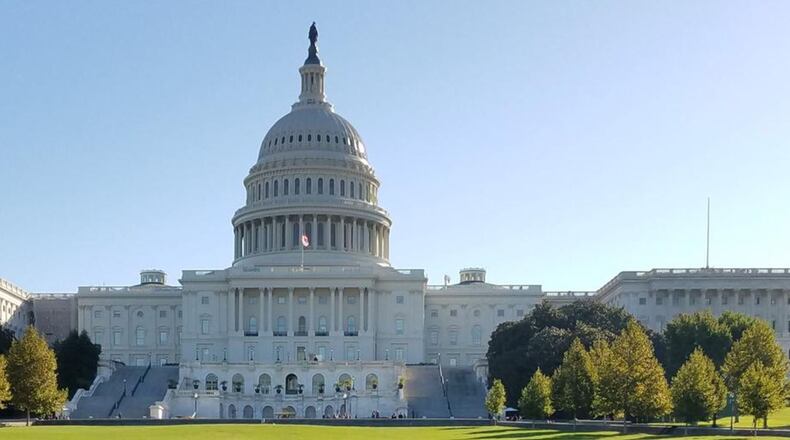It was hard to tell that the House of Representatives had just narrowly approved a Senate-passed budget outline for 2018, because most of the talk on and off the House floor on Thursday was about lawmakers moving on to forge a tax reform bill in coming weeks, as GOP leaders predicted that Republicans would unify behind a still-to-be-released plan, and get it done by Christmas.
"We're glad it passed," said a smiling Rep. Doug Collins (R-GA). "This is our first step toward tax reform."
"This budget that we passed in the House brings us one step closer to historic tax reform," said House Speaker Paul Ryan.
Here is where things stand on that GOP push for tax reform:
1. GOP to release an actual bill next week. For months, they've been talking about tax reform. Now, mark your calendars for November 1 - that's when the Chairman of the House Ways and Means Committee, Rep. Kevin Brady (R-TX) will release the initial GOP tax reform draft. Known as the "Chairman's mark," that will prompt a flurry of activity, as lawmakers and lobbyists will finally get to see what might be in a reform of the Internal Revenue Code. In 1986, the last time we had major tax reforms approved by Congress, it took 13 months from the release of the Chairman's mark until a bill was signed into law. Republicans want to do it in about six weeks, with a break for Thanksgiving in between. That is an audacious schedule to say the least. But that's the plan for now.
2. The details will be very important. I cannot stress enough how many details will be involved in a tax reform bill. Go back three years, and the former Ways and Means Committee Chairman Dave Camp (R-MI) released his own tax reform plan - it was well over 900 pages, and addressed dozens and dozens of issues. (That bill went nowhere.) If you are going to do true reform, it is not simple. It is not achieved in only a couple of pages. In true reform, there are big winners and big losers. Just look at all the talk about state and local taxes, mortgage insurance deduction, 401(k)'s and more. Lofty generalizations didn't work on health care - and they won't work on tax reform either. And then, there is always the reaction of the President to the fine print - we saw it earlier this week on 401(k) matters.
3. Already a number of GOP red flags. The vote on the budget outline in the House sent a clear political distress signal, as a number of Republicans from New York and New Jersey won't support a tax plan that takes a big chunk out of the State and Local tax deduction (referred to as SALT). Democrats and Republicans tried to get rid of that deduction back in 1986, but were forced to back then, and it could happen again. One wild card is the Texas delegation, a state that has no income tax, but has relatively high local property taxes, which result in many in the Lone Star State using that deduction. "We need tax reform but not on backs of New Yorkers," said Rep. Dan Donovan (R-NY). Look at the "No" votes on the budget, and you see that State and Local tax revolt clearly.
Credit: Jamie Dupree
Credit: Jamie Dupree
4. Don't expect Democrats to get on board. If you were asking me to set a Vegas over/under line on the number of Democrats who would vote for a GOP tax reform plan - I might be tempted to put the over/under at one. I'm sure there are a couple of Democrats who are thinking about it, but you certainly don't hear much of that at all in the hallways of the Capitol. Back in 1986, tax reform was a very bipartisan effort. In fact, the original plan in the Senate was approved on a vote of 97-3. You read that right, 97-3. The final vote was 74-23. The final bill got 292 votes in the House. But in 2017, bipartisanship is uncool for a variety of reasons, and this GOP-only designed tax bill will probably only insure that Democrats are on the sidelines - and opposed.
5. Will it be tax reform? Or tax cuts? Watch the language being used in coming weeks by the President and Republicans in Congress, because tax reform is different than tax cuts. The GOP could probably approve a package of tax cuts by Christmas in short order - but a major tax reform plan will be much trickier. President Trump routinely talks tax cuts, and then seems to stick a couple mentions in of tax reform, just to make sure he is hitting that note. But it won't surprise me for serious tax reform to go by the wayside if the GOP runs into big problems getting enough votes in the House and Senate. Again, tax reform is more difficult than health care. There are real winners and real losers in every change you make. You cannot design a tax reform bill that makes every taxpayer a winner.
About the Author
The Latest
Featured




